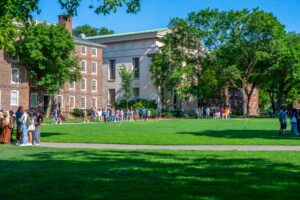The University of California system colleges are some of the top public schools in the country, and like all top schools, their admissions rates have been dropping over the past years. Our University Guides explore several of their campuses in great detail, but today we want to look more closely at admissions requirements for the schools.
Luckily, the UC schools publish their admissions requirements, along with statistics covering admitted students. In this article, we’ll go through this information, link to it, and explain how it should impact your own applications. Let’s get started!
UC Berkeley
Here is the information published by Berkeley:
UC Davis
Here is the information published by Davis:
UC Irvine
Here is the information published by Irvine:
UCLA
Here is the information published by UCLA:
UC Merced
Here is the information published by Merced:
UC Riverside
Here is the information published by Riverside:
UC San Diego
Here is the information published by San Diego:
UC Santa Barbara
Here is the information published by Santa Barbara:
UC Santa Cruz
Here is the information published by Santa Cruz:
Interpreting This Information
This is a lot of information, and can be difficult to parse. Now we’ll go through how to interpret what these pages are saying, and how you can best use what you learn from them. We’ll cover each of the three pieces.
Common Data Set
The Common Data Set is information colleges collect and report to professional industry organizations, which is used to create college rankings. This covers demographic information, enrollment, admissions, waitlisting, transfer admissions, student life, financial information (both costs and aid), and information on faculty and class sizes.
This is a lot of information, and is generally presented through tables and statistics; it is not formatted for easy consumption. The most interesting part for most students is the waitlist section; this describes how many students were put on the waitlist, and how many of those were eventually admitted. We have an article on what to do if you’ve been waitlisted, but this information can let you ascertain whether trying to get admitted off the waitlist is a likely prospect.
While the admissions data is useful, it is presented in a far more easily digestible form elsewhere on the schools’ websites.
Freshman Admit Data
These pages are very basic; they list how many students applied in the last admissions cycle, how many were admitted, and the overall acceptance rate. They also list average GPAs for admitted students. This is good if you want to know acceptance rates, and the overall number of students who are applying.
Freshman Requirements
The freshman requirements pages vary in structure, but all have the explicit purpose of explaining what these schools want from applicants, and their process for reviewing applications.
They usually start with the minimum requirements; which are the academic benchmarks you need to hit in order to be considered for admission at all. They are all careful to note that just hitting these benchmarks is not enough to guarantee acceptance, and top students usually far surpass these minimums.
Next they go over how they handle applications. While each school has a slightly different process, they all use some form of holistic review. They list what they look for in students, from character traits to strengths. This is not entirely prescriptive; there is no one set of traits that will get you accepted into these colleges automatically, but instead describes the kinds of students these schools want to see.
This can help you know which of your traits and experiences to highlight in your essays, and what additional context is worth providing. We want to note that all the UC schools take your circumstances into account when making admissions decisions, and evaluate your accomplishments in the context of your resources.
Final Thoughts
While there is no set formula to get into the UCs, the data these schools provide is an amazing window into how their admissions process works. We hope that by collecting this information, and explaining what it means, you get a better sense of what the UC schools are looking for from applicants.
While not all colleges are quite as open as the UCs, there is a lot of information out there on what colleges are looking for in applicants. Of course, it takes time to sift through this to find the most useful pieces for you. If you want to hear how we can help you with your college applications, schedule a free consultation today. We have a long experience guiding students through the admissions process, and are always happy to hear from you.








